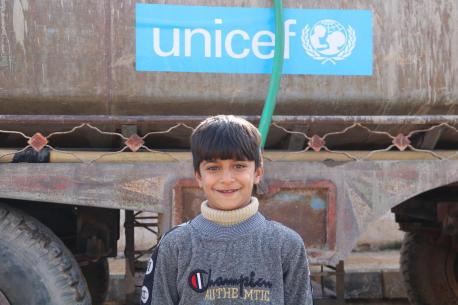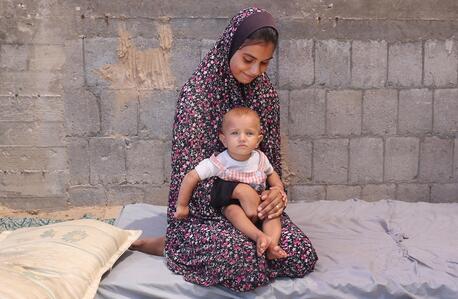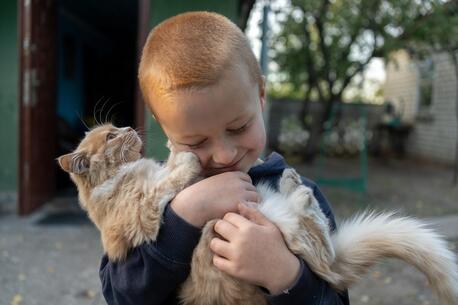
After a Dozen Years of Conflict, Syria's Children Need Peace
As the conflict in Syria enters its 13th year, millions of children continue to live in fear of attacks and displacement, with no end in sight. UNICEF is working with partners to reach Syria's youngest generation with life-changing support and services.
More than a decade of conflict has left children in Syria growing up in the midst of one of the world's most complex humanitarian emergencies.
Even before the catastrophic February earthquakes, two-thirds of Syria's population required assistance because of a worsening economic crisis, ongoing hostilities, mass displacement and crippled public infrastructure. Around 90 percent of Syrians are living in poverty. More than 50 percent are food insecure; millions are at heightened risk of starvation.
Millions of children born since the war began in 2011 know nothing but war. They are living with both physical and psychological scars.
The challenges are massive, but through it all, with the support of donors, UNICEF continues to reach Syria's children with the support and services they urgently need to reach their full potential.
Children share their stories of life in a war zone:
"If I eat my vegetables, will my foot grow again?"

Since the start of the conflict, nearly 13,000 children have been killed or injured. Twelve-year-old Maram lost her leg when she was only 4.
"If I eat my vegetables, will my foot grow again?" Maram used to ask her mother, Sahar. "She was too young to understand what had happened," Sahar recalled. "I would try to calm her when she asked."
Attacks forced the family to move over and over again. Loud noises frightened Maram. When she started school at age 7, some of the other children teased her for using a crutch. She started missing school more and more often.
With help from an NGO, Maram received a prosthetic leg; visits to a UNICEF-supported children's center near her home in Aleppo city have helped her regain her confidence and return to school. "I liked the way the volunteers at the center treated us," she said. "They were friendly and helpful."
Unexploded ordnance remains a deadly threat

Over a decade of missile attacks have left children surrounded by the threat of unexploded ordnance. In 2022, UNICEF reached more than 1 million people in Syria with education on the dangers of landmines and explosive hazards.
Bashar was 7, playing football with his two older brothers and their friends in a field near their home in rural Damascus, when they ran over unexploded ordinance. The missile exploded, killing his brothers instantly and shattering Bashar's legs.
He learned to get around in a wheelchair, even playing football again with friends, using a bottle filled with sand for a ball. But he longed to walk again. And he missed his brothers. “I miss following them around wherever they went, hanging out with them and their friends,” he said.
The day he received his prosthetic legs, "I felt joy in my heart," said Bashar, now 11. "I started seeing things around me from a new height."
Every morning, the fourth grader wakes early to help his mother open the small grocery store she runs. Then she helps him put on his legs and he heads off to school.
“I was top of my class in English and Arabic last term,” Bashar said with a smile. He dreams of becoming an architect, to build homes for families like his, that have been displaced by the war.
Rebuilding schools to help children get back to learning

The conflict has taken a tremendous toll on children's education in Syria. Many schools have been damaged or destroyed; others are being used to shelter displaced families or for military purposes. By late 2022, only two-thirds of the country's schools were fully functional; about 2.4 million children remain out of school and another 1.6 million are in danger of dropping out.
To get children back to learning, UNICEF and partners are rehabilitating school buildings like the Martyr Mohamed Ibrahim Alosh elementary school in Zamalka town, eastern Ghouta, where 7-year-olds Karam and Mohamed are friendly rivals in Arabic class.
“Today we are learning the letter B, and I am competing with Mohamed," Karam explained cheerfully. "His handwriting is more beautiful, and he is my best friend.”
"Sit next to me, an earthquake might happen now."

When the first earthquake hit northwest Syria in the middle of the night on Feb. 6, 2023, 13-year-old Maysaa's first thought was her little sister, 6-year-old Renad. "The house was swaying, so I said to myself, anything but my sister,” Maysaa recalled.
The girls and their family are among the millions forced out of their homes and into temporary shelters by the quakes and thousands of aftershocks. For Syrians who have already lived through 12 years of war, this latest catastrophe is an emergency on top of an emergency.
Maysaa has put aside her own fears to comfort Renad. “My sister still gets scared, and whenever she sits, she tells me, ‘Sit next to me, an earthquake might happen now,’ and she cuddles with me,” Maysaa said.
Syria's children need our support now more than ever
Across Syria, UNICEF works with partners to deliver and scale up humanitarian aid for children. There is much more to be done.
“The children of Syria cannot wait any longer. After years of conflict, and two catastrophic earthquakes, the futures of millions of children hang by a thread,” said UNICEF Regional Director for the Middle East and North Africa Adele Khodr. “It is our collective responsibility to reaffirm to children that their future is our priority too.”
HOW TO HELP
There are many ways to make a difference
War, famine, poverty, natural disasters — threats to the world's children keep coming. But UNICEF won't stop working to keep children healthy and safe.
UNICEF works in over 190 countries and territories — more places than any other children's organization. UNICEF has the world's largest humanitarian warehouse and, when disaster strikes, can get supplies almost anywhere within 72 hours. Constantly innovating, always advocating for a better world for children, UNICEF works to ensure that every child can grow up healthy, educated, protected and respected.
Would you like to help give all children the opportunity to reach their full potential? There are many ways to get involved.





